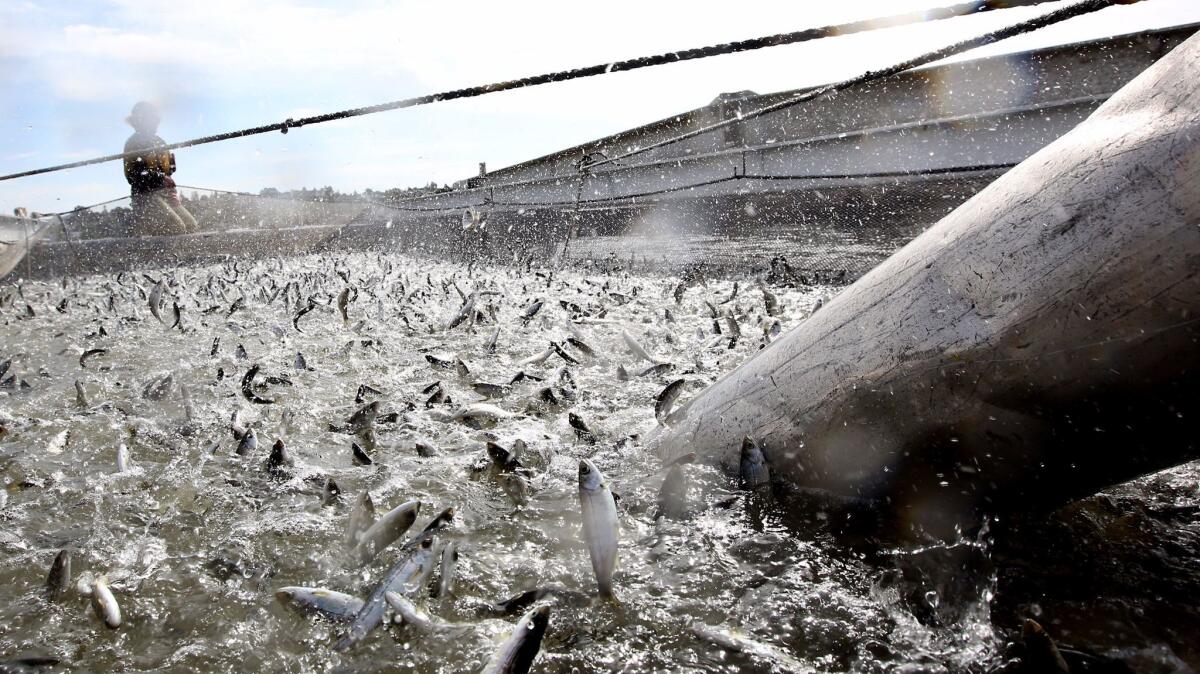Editorial: A water deal that’s bad for California’s environment

- Share via
There is much for Southern Californians to like in departing U.S. Sen. Barbara Boxer’s final bill — to authorize federal water projects — including funding to restore the Los Angeles River and to pay for various water storage and groundwater efforts.
And then there are the provisions Boxer’s colleague and fellow California Democrat, Sen. Dianne Feinstein, negotiated with Republicans and their supporters in San Joaquin Valley’s agriculture industry to squeeze more usable water from the Sacramento-San Joaquin River Delta for farmers in drought years.
At issue in the delta and the rivers that feed it are the rules that govern when and how much water can be diverted for farms and homes instead of being allowed to keep flowing through rivers and into the delta to protect endangered salmon.
The so-called drought provisions are unacceptable.
California’s two senators have long approached water issues from different angles but generally managed to agree. Not this time. When Feinstein and Republicans inserted their provisions in Boxer’s bill late last week, Boxer threatened to scuttle the whole package. She said the delta provisions would undermine the Endangered Species Act and could irreparably damage the state’s salmon and the thousands of jobs that depend on the Pacific salmon fishery, not just off California’s coast, but off Oregon’s and Washington’s as well.
Environmentalists have balked at the Feinstein proposal, just as they opposed a drought bill she proposed earlier this year. That measure also was aimed at making delta rules more flexible to keep water flowing to farms during periods in which it arguably wasn’t needed for fish. Notwithstanding the concerns, that bill was a prudent compromise and might have been acceptable had it been an end-point — part of a grand bargain between the various factions to end the long-running California water wars.
So the question now is whether the new provisions that Feinstein has brokered with Republicans are appreciably different from her earlier version, or whether circumstances have changed enough to warrant endangering the entire bill and all the funding it allocates to badly needed water projects.
The regrettable conclusion must be that the so-called drought provisions are unacceptable.
Circumstances certainly changed with the election of Donald Trump and the climate-change-denying, environmentally challenged cabinet members he is considering or has already appointed. Although the bill’s rules governing when delta pumps can operate and how water must be managed are technical and subject to interpretation, they grant Trump’s secretaries of Commerce and Interior an important role in determining when to divert less water and leave more for endangered fish and the environment. That sort of discretion might have been tolerable if entrusted to cabinet members of an environmentally responsible administration, but it must be seen in a different light with a White House with a decidedly different approach to the environment.
An internal memo from the current White House also notes that since Feinstein’s earlier bill, populations of endangered salmon and smelt have significantly declined. Even the current program of scientific findings may be insufficient to protect the fish as required under the Endangered Species Act.
The proposed drought-year legislation would appear to be directly at odds with current, laudable efforts by the State Water Resources Control Board to ensure the presence of enough water in the lower San Joaquin River — close to the delta pumps — to sustain migrating salmon, which are not merely another fish but integral to California’s ecology, culture and history.
All that aside, Feinstein’s effort to add some flexibility to delta rules to provide more water for farms and urban areas in times of drought — despite serious concerns that they could weaken species protection — might still be worth the risk if they were part of a final compact between environmental and agricultural interests on delta water.
But there is still no final compact, no grand bargain, and in fact the recent election has only emboldened Republicans who are targeting the Endangered Species Act. House Majority Leader Kevin McCarthy of Bakersfield and other members of Congress who represent the San Joaquin Valley have made it clear that they intend to press further to divert more Sacramento and San Joaquin river water to agricultural use rather than letting it flow into the sea to sustain the state’s increasingly fragile environment. The drought language, negotiated in private and inserted into Boxer’s bill at close to the last minute, would embolden them further if adopted. Let’s hope that Kamala Harris, Boxer’s successor, has been paying attention and is prepared to stand up for California’s increasingly fragile environment.
Follow the Opinion section on Twitter @latimesopinion and Facebook
A cure for the common opinion
Get thought-provoking perspectives with our weekly newsletter.
You may occasionally receive promotional content from the Los Angeles Times.






